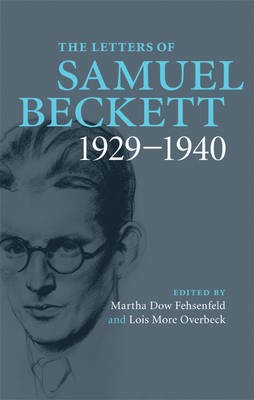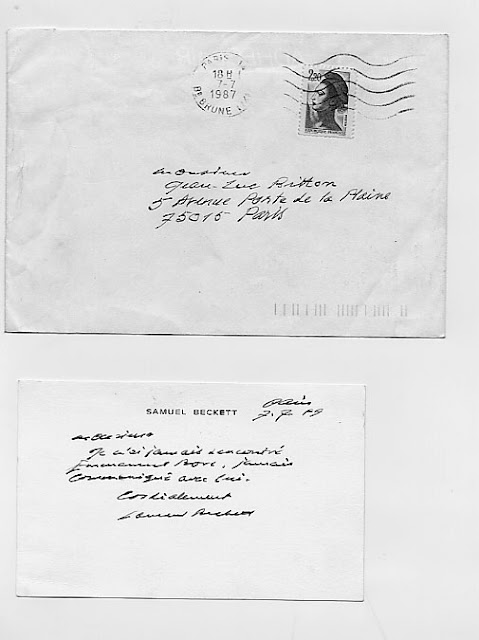The first of four landmark volumes soon to be published

'The prospect of reading Beckett's letters quickens the blood like none other's, and one must hope to stay alive until the fourth volume is safely delivered.'
Tom Stoppard
A hugely ambitious four-volume collection of Samuel Beckett's letters is to be released, with the first volume hitting the shelves in early February. Edited by Martha Dow Fehsenfeld and Lois More Overbeck, it is the only comprehensive collection of his letters ever to be published. And as it's also authorized by the Samuel Beckett Estate, it promises to be a rich source of new material for academics and casual readers alike.
The first volume, spanning from 1929-1940, includes Samuel Beckett's formative years as an academic and aspiring young writer. The letters have been printed in a beautiful and easy-to-read typeface, and are annotated with footnotes from page-to-page. Letters in German and French are included in their original language alongside a translation, enabling all readers to enjoy them, and there is a helpful series of profiles to introduce the recipients. As if that wasn't enough, there is also a chronology placing the letters within Beckett's personal and historical context.
'Knowing as we do that Samuel Beckett is the only writer who can sum up the agonies and ecstasies of the twentieth century, if we had any doubts as to his relevance today, they would be dispelled by the amazing treasure trove contained in his letters - at last we are made privy to the full range of his passion for art and beauty, which is neither naive nor sentimental, to the pyrotechnics of his savage wit, and more lastingly perhaps, to his deep humanity.'As this is the first in a series of four volumes, I am extremely excited to see how the letters develop. From a young, brilliant, and somewhat arrogant academic, the early correspondence offers glimpses of a sometimes frustrated but potentially gifted writer.
Jean-Michel Rabaté
He maintains contact with friends, painters and musicians along with students, colleagues, translators and publishers; there is a sense at which, without yet reading a page, we are going to get the full compass of Beckett's early interests and social contacts. His admiring and respectful contact with James Joyce, for instance, while helping with the 'Work in Progress' that was to become Finnegans Wake. I'm looking forward to seeing correspondence between his friends and family, and how it links with biographical accounts or interviews I have read.
'For anyone interested in twentieth-century literature and theatre this edition is essential reading, offering not only a record of Beckett's achievements but a powerful literary experience in itself.'
Cambridge University Press (CUP)
I think it will be fascinating to see how much the early letters reveal of Beckett himself, or of the letters' relationship with his published work. I already suspect that the letters will be written according to their recipient, and be warm and personal or cold and formal according to their purpose. But while I'm sure there will be moments where the words may shine off the page, I'm not convinced the letters will bring us much closer to the writer himself. A little, perhaps, but not a lot. Ambitious attempts at attaining the 'big picture' of who a person is, and what they mean or represent, always fall short of the mark. The pressure is just too great.

But that's not to say that I'm not looking forward to them! In fact, I can relate to what Tom Stoppard says about hoping to stay alive until the final volume is published. Thankfully, I am still in my youth, but perhaps I should take some precautions just in case.
The four volumes span from 1929 to the writer's death in 1989. I think it will be fascinating to see whether the letters change in their style or length as Beckett's friends change, or his literary style evolves. Could it be that he eventually simplifies down to single-word responses? A friend and I recently exchanged a number of emails in a mock-Beckett fashion, arranging to meet one evening for dinner; the whole process became exasperating as we tried to convey practical information with phrases like 'A city street. A bridge. Evening' or 'When done. Where still to do.' It would be wonderful to see if Beckett ever achieved it himself. (Note: although I'm joking here, it does sound like a superb way of alienating close friends and relatives.)
There's no doubt about a future blog when the Letters are finally published. I'll write something up once I've had time to digest some of it. But in the meantime, you can preorder the book yourself from Amazon, and even read the first few pages by selecting the 'Look Inside!' option. The 30-page index is pretty stunning, I must say. Cambridge University Press, who are publishing this monumental work, also have a page relating to the series. All the early signs suggest that this collection is going to be quite something.


